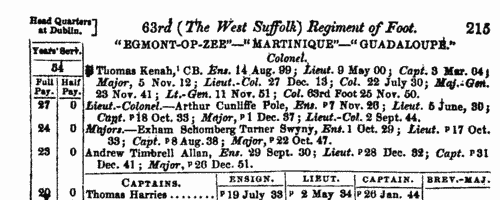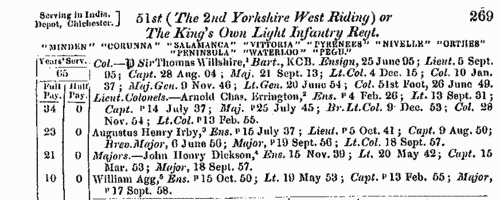Dinwiddie Surname Ancestry ResultsOur indexes 1000-1999 include entries for the spelling 'dinwiddie'. In the period you have requested, we have the following 47 records (displaying 31 to 40): Single Surname Subscription | | | Buying all 47 results of this search individually would cost £236.00. But you can have free access to all 47 records for a year, to view, to save and print, for £100. Save £136.00. More... |
These sample scans are from the original record. You will get scans of the full pages or articles where the surname you searched for has been found. Your web browser may prevent the sample windows from opening; in this case please change your browser settings to allow pop-up windows from this site. Railway Subscription Contracts
(1845)
£21,386,703 6s 4d was promised by about 10,000 subscribers of less than £2,000 per contract to the nearly 200 railway bills deposited in the Private Bill Office during the Session of Parliament for 1845. This alphabetical list gives the full names of the subscribers (surname first), description (i. e., occupation), place of abode, a numerical reference to the title of the railway, the amount subscribed to each, and total. There is a separate key to the titles of the railways.DINWIDDIE. Cost: £4.00.  | Sample scan, click to enlarge

| British Army Officers
(1853)
The 14th volume of the New Annual Army List, for 1853, corrected to 30 December 1852, was published by Major H. G. Hart of the 49th Regiment. It contained 'the dates of commissions, and a statement of the war services and wounds of nearly every officer in the Army, Ordnance and Marines'. The first section, pages 1 to 111, lists officers of the rank of major and above in order of rank and precedence; officers with local rank (112-114); Yeomen of the Guard (115); the Honourable Corps of Gentlemen-at-Arms (116); Headquarters Staff (117); and then (as in the scan) all the regiments and units in order of precedence, giving any regimental honours, with all the officers by rank, and details of postings, facings and agents (118-336). A long section (337-426) then lists officers on the retired full pay and half-pay, including the Royal Regiment of Artillery, Corps of Royal Engineers, Royal Marines and military departments. Then there are lists of officers in the Commissariat Department, the Medical Department, Veterinary Surgeons and the Chaplains Department. A section of Officers on the Foreign Half-Pay gives lists for the German Legion and Miscellaneous Corps (Brunswick Cavalry, Brunswick Infantry, Chasseurs Britanniques, Royal Corsican Rangers, Dillon's Regiment, Greek Light Infantry, Royal Malta Regiment, Meuron's Regiment, Roll's Regiment, Sicilian Regiment, Watteville's Regiment, York Light Infantry Volunteers, the Foreign Veteran Battalion, and the Foreign Corps of Waggoners). After lists of officers in garrisons and military establishments, there are sections listing officers holding Gold Decorations for their parts in various important actions and other British decorations, and those holding medals bestowed by foreign powers. DINWIDDIE. Cost: £4.00.  | Sample scan, click to enlarge

| Gentry in London
(1856)
The Post Office London Directory for 1856 includes this 'Court Directory', listing alphabetically by surname and christian name the upper class residents of the capital with their postal addresses. 'In order to afford space for the addresses, the abbreviation "esq." for esquire has no longer been appended to each name in the Court Directory. It should be understood that such should be added to the name of every gentleman in the following pages to which no inconsistent addition is affixed.' Decorations, honours &c. are generally given. Some gentlemen appear who are also listed (as professional men, &c.) in the commercial section. Those with second residences in the provinces usually have the country address given as well.DINWIDDIE. Cost: £4.00.  | Sample scan, click to enlarge

| Assignments of bankrupts' estates in England and Wales
(1858)
Perry's Bankrupt and Insolvent Gazette, issued monthly, included lists of assignments of bankrupts' estates. Each entry gives the name of the bankrupt (surname first, in capitals), the date (in brackets), address and trade; followed by the names and addresses of the trustees to whom the estate was delivered, and the name and address of the solicitor. This is the index to the names of the bankrupts, from the issues from January to December 1858.DINWIDDIE. Cost: £6.00.  | Sample scan, click to enlarge

| Officers of the British Army
(1860)
The New Annual Army List first lists officers of the rank of major and above, by rank, and with dates of appointment to each successive higher rank, and (where appropriate) when placed on half pay. An asterisk indicates temporary rank; a superscript p shows that a commission was purchased; a dagger shows officers on the half pay of their last regimental commission. An ornate W indicates those officers actually present in any of the actions of 16, 17 or 18 June 1815 and therefore awarded the Waterloo Medal; P is put before the name of an officer who served in the Peninsula or the South of France; T for the Battle of Trafalgar; VC for the Victoria Cross. For each officer in this section, the final column notes his then present or immediately former regiment and/or office, if any. Next, all the officers of the army are listed, down to the rank of ensign, by regiment or corps, giving rank, name, date of rank in the regiment, and date of rank in the army, with occasional further notes. Again, holders of medals are duly noted, as in the first list. For each regiment the paymaster, adjutant, quartermaster, surgeon and assistant surgeons are named, as well as the civilian agent; and the regimental motto, battle honours, and colours of the facings and lace of the dress uniform are stated. After the British regiments of the line, the Rifle Brigade, the officers of the West India infantry, the Ceylon rifles, the Cape Mounted Riflemen, the Royal Canadian Rifles, St Helena Regiment and the Gold Coast Artillery Corps are given; then the officers of the garrisons and other military establishments; the Royal Artillery; Royal Engineers; Royal Marines; Commissariat Department; Medical Department; Staff Officers of Pensioners; Chaplains' Department; Staff (of Great Britain, Australia, Bahamas, Bermuda, British Columbia, Cape of Good Hope, Ceylon, East Indies, Falkland Islands, Gibraltar, Heligoland, Hong Kong, Ionian Islands, Jamaica (including Honduras), Malta, Mauritius, Newfoundland, North America, St Helena, the Western Coast of Africa, and the Windward and Leeward Islands); Military and Civil Department; and Barrack Masters. Then there is a separate list of officers retained on retired full pay and half pay (including the German Legion, the Brunswick Cavalry, the Brunswick Infantry, Chasseurs Brittaniques, Royal Corsican Rangers, the Greek Light Infantry, Royal Malta Regiment, Meuron's Regiment, Roll's Regiment, Sicilian Regiment, Watteville's Regiment, the York Light Infantry Volunteers, Foreign Veteran Battalion and the Foreign Corps of Waggoners).DINWIDDIE. Cost: £4.00.  | Sample scan, click to enlarge

| Bankrupts, Assignees, Trustees and Solicitors
(1880)
Bankruptcy notices in England and Wales, July to September 1880DINWIDDIE. Cost: £6.00.  | Sample scan, click to enlarge

| Missing Next-of-Kin and Heirs-at-Law
(1880)
The Unclaimed Money Registry and Next-of-Kin Advertisement Office of F. H. Dougal & Co., on the Strand in London, published a comprehensive 'Index to Advertisements for Next of Kin, Heirs at Law, Legatees, &c., &c., who have been Advertised for to Claim Money and Property in Great Britain and all Parts of the World; also Annuitants, Shareholders, Intestates, Testators, Missing Friends, Creditors or their Representatives, Claimants, Unclaimed and Reclaimed Dividends and Stock, Citations, Administrations, Rewards for Certificates, Wills, Advertisements, &c., Claims, Unclaimed Balances, Packages, Addresses, Parish Clerks' Notices, Foreign Intestates, &c., &c.' The original list was compiled about 1860, but from materials dating back even into the 18th century: most of the references belong to 1850 to 1880. For each entry only a name is given, sometimes with a placename added in brackets: there may be a reference number, but there is no key by which the original advertisement may be traced. The enquirer of the time had to remit £1 for a 'Full and Authentic Copy of the Original Advertisement, together with name and date of newspaper in which the same appeared'. DINWIDDIE. Cost: £4.00.  | Sample scan, click to enlarge

| Scottish Debtors, Insolvents and Bankrupts
(1886)
Protests on Bills of Exchange, Sequestrations and Cessio Bonorums in Scotland, July to September 1886DINWIDDIE. Cost: £6.00.  | Sample scan, click to enlarge

| Boys at University College School
(1860-1900)
In 1830 a school was set up adjoining the University and College of London on Gower Street; the school was enlarged from 1860 to 1876, and then removed to Frognal in 1907. In 1931 this register was published, listing all boys entering the school from Christmas term of 1859 to the summer entrants of 1931. The dates are abbreviated (98-01 = 1898-1901, &c.), each session being reckoned as beginning in September of one year and ending in the July of the next; the date of joining the school is indicated by the former, although it may fall in the latter, but the date of leaving by the latter, although it may fall in the former. Thus, if a boy came at any time during the Session 1863-64 and left any time during 1868-69, his date would be given 1863-69. The boys are listed alphabetically by surname, and then chronologically under each surname, full name being given where known. An asterisk * indicates that that particular boy lost his life in the Great War: in these cases, rank and regiment have been given where possible. Addresses as of 1931 are given where known. Italics in christian names or initials indicate that that particular boy was known, in 1931, to be dead. (a) (b) &c placed before christian names indicates brothers. In some cases occupation in later life is shown (A, artist; B, barrister; C A, chartered accountant; Ch, chemist; E, engineer; H C S, home civil service; I C S, Indian civil service; Med, physician or surgeon; M S E, member of the Stock Exchange; Mus, musician; Rev, minister of religion; S, solicitor). This is the index to those boys who were at the school in the period 1860 to 1900.DINWIDDIE. Cost: £4.00.  | Sample scan, click to enlarge

| India Public Works Department
(1905)
The India List and India Office List was compiled from official records by direction of the Secretary of State for India in Council, and published by the India Office annually. It covers civil servants and military except for officers drawing substantive pay of less than 500 rupees a month. Names shown in italics are those of officers in foreign service, supernumerary, seconded or employed outside their own departments. The section for the Public Works Department of the central administration lists chief and superintending engineers for Irrigation, Roads, and Buildings; engineers in the local administrations of Central Provinces, Assam, Coorg, Rajputana and Central India; and examiners from the Accounts Branch.DINWIDDIE. Cost: £4.00.  | Sample scan, click to enlarge

|
Research your ancestry, family history, genealogy and one-name study by direct access to original records and archives indexed by surname.
|












